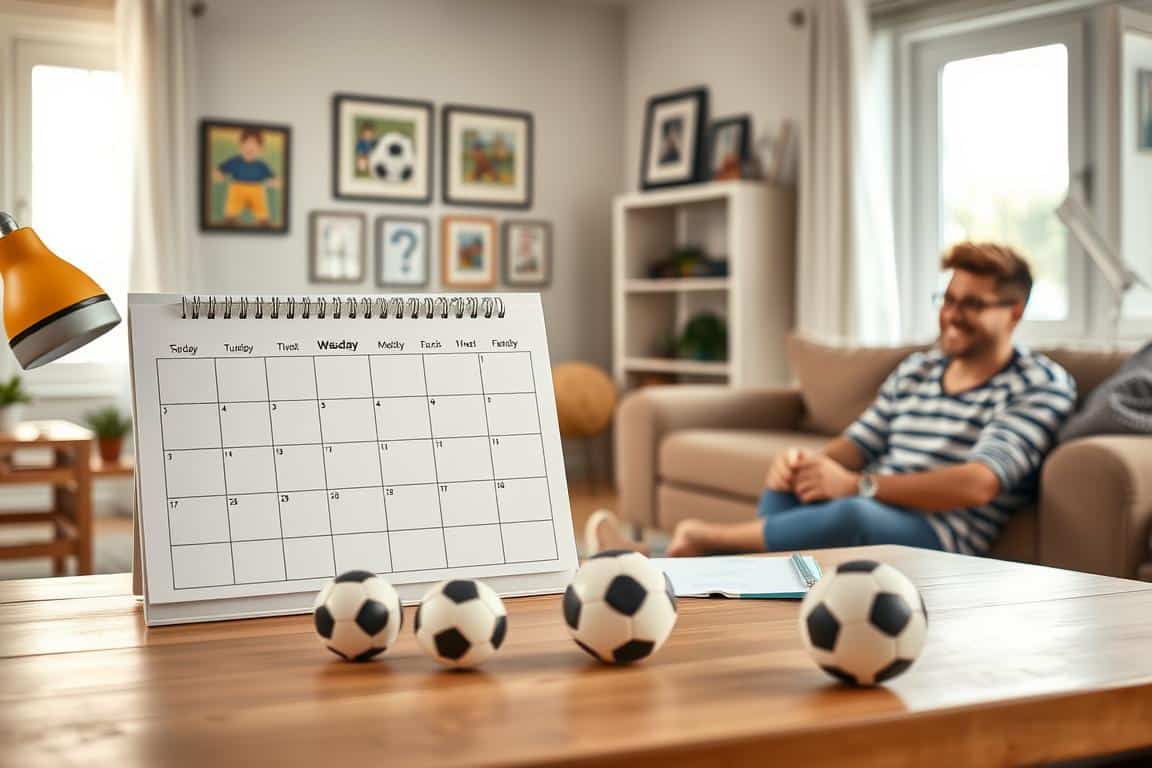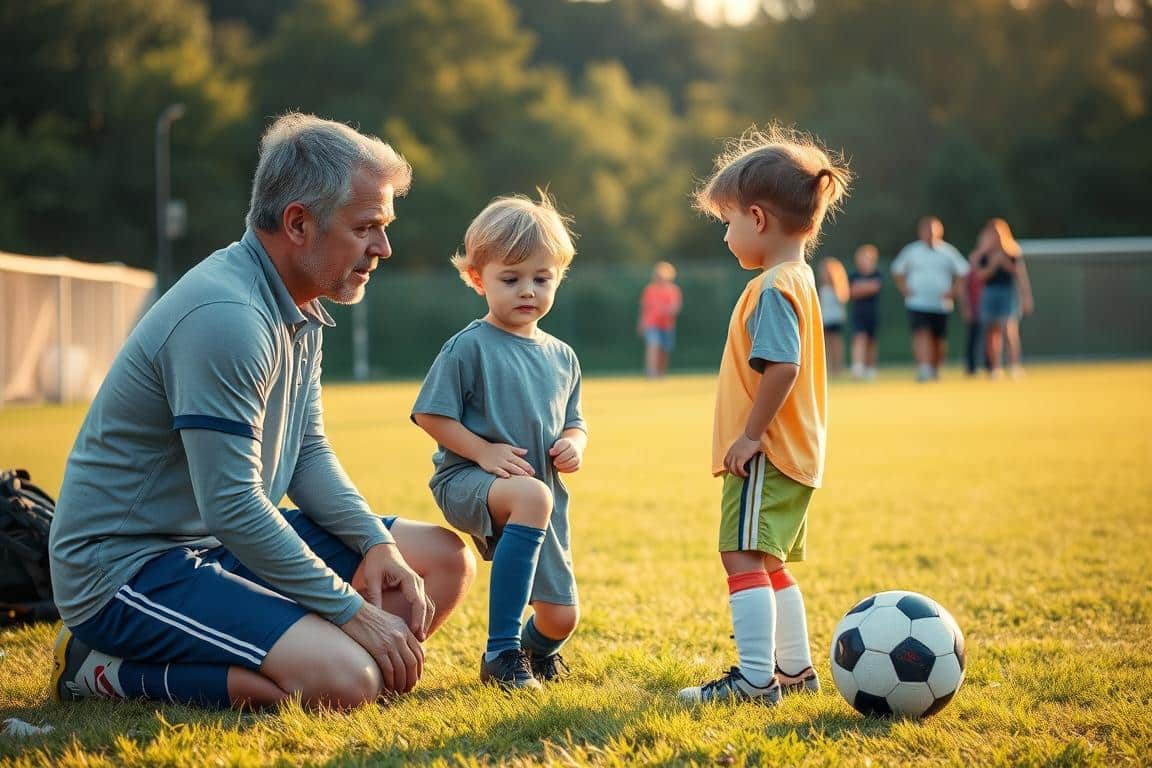Soccer Parenting for Busy Families: Simple Strategies

I wrote this to help you save time and still support your child with simple, proven steps you can use this week.
Small, focused work at home turns into real skill gains. Quick wall reps, short juggling sets, and a few weak-foot touches add hundreds of useful contacts. I show clear, practical moves you can fit into a hectic week.
You’ll see how to map a clean season plan, keep the car ready, and match short home practice to club training. I give direct advice on sideline calm, positive praise, and coaching the conversation with your child and the coach.
Every tip is small, measurable, and built so parents can create steady wins without long drills. If you want a simple routine that builds confidence and control, start with these steps and visit support your child for more ideas.
Key Takeaways
- Short home sessions add meaningful touches and boost skill.
- Focus on weak-foot reps, wall work, and quick juggling.
- Plan your season and week to reduce stress and save time.
- Use calm praise and guide your child to talk with the coach.
- Track minutes practiced and simple measures of success.
Soccer parenting for busy families: set up a week that works
Let’s map a simple weekly plan that keeps practices, games, and travel in one clear view.
Block the season on a shared calendar. Add practices, games, and travel times. Color-code events and include drive time and a parking buffer.

Build a simple season calendar
Set a weekly review on Sunday night. Confirm times with coaches and update changes. Share the calendar with all parents who help.
Create a car and road routine
Pack the car the night before with uniforms, cleats, shin guards, extra socks, water, and a first-aid pouch. Keep a road bin stocked with sunscreen, bug spray, plastic bags, tools, and a charger.
Use shared lists for gear and post-game needs
Use one shared checklist for gear, one for snacks and hydration, and one for post items like ice packs and recovery food. Assign roles: one parent confirms fields, another handles snacks and carpools, and a backup covers pick-ups.
- Book hotels close to fields on travel weekends to save time.
- If you need rest, pick a quiet hotel and still join team meals.
- Choose quick meals kids digest well: water, fruit, simple carbs, light protein.
| Task | Who | When | Why |
|---|---|---|---|
| Block season on calendar | Parent lead | Before season starts | Avoids last-minute scrambles |
| Pack car night before | Any parent | Night before game day | Starts the day calm |
| Road bin stocked | Parent helper | Maintain weekly | Solves small emergencies |
| Weekly Sunday review | Team parent | Sunday night | Keeps everyone aligned |
If you want extra tips on travel weekends and tournament routines, see our parents’ guide to tournaments.
Make home practice easy: short sessions that add real touches
Little sessions, done daily, build a steady stream of real ball touches. Try two micro-sessions a day. Each one is five to ten minutes. Pick one focus and use a timer.
Stack micro-sessions
Run two short blocks: a morning touch routine and an after-school skill set. Pick toe taps, sole rolls, or inside-outside touches. Keep setup minimal so practice fits in busy times.
Develop the weak foot
Use a wall or rebounder for repeatable reps. Aim for 50 inside passes, 50 laces passes, then 20 traps and passes with the non-dominant foot.
Add juggling and growth cues
Five minutes of juggling boosts aerial control and first touch. Use a simple ladder: two-foot alternation, thigh-to-foot, then head-to-foot. Count streaks and log best tries.
- Give specific praise: “Nice first touch to space.”
- Offer one coaching cue: “Eyes up before the pass.”
- End with a one-minute challenge so kids leave smiling.
| Drill | Time | Focus |
|---|---|---|
| Rebounder reps | 10 min | Weak foot, first touch |
| Juggling ladder | 5 min | Aerial control, balance |
| Sole rolls & turns | 5–10 min | Ball control, quick turns |
Be a great sideline parent and support coach-player communication
A calm sideline helps players focus and learn.

Stay calm on the sidelines. Cheer effort and teamwork. Let the coach handle tactics, subs, and fixes during the game.
Avoid instructing players or arguing with refs. Loud calls distract kids and can hurt the team at key times on the field.
Guide your child to talk with the coach
Before the next match, help your player script two respectful questions. Try: “What can I work on to earn more time?” or “How can I help the team next game?”
Teach your child to ask after practice or at a set time. Not right after a tough play or at the final whistle.
- Set a family rule: no instructions, no ref talk, no play-by-play during the game.
- Use short praise: “Great hustle,” “Love the effort,” “Nice recovery run.”
- Share one example each week of good sports behavior you saw from any player.
| Action | Why | When |
|---|---|---|
| Cheer effort only | Keeps players focused | During game |
| Script questions with your child | Prepares respectful conversations | Before practice |
| Talk to coach respectfully | Supports team goals | After practice or by appointment |
When sidelines get tense, step back and reset. Your steady voice helps wins in learning that last for years beyond a single result.
Protect health and well-being across the season
When a head hit happens, quick calm action guides a safer return. I urge parents to treat every bump seriously. Rest matters as much as medical care.
Know common signs: headache, dizziness, nausea, light or noise sensitivity, confusion, mood shifts, or trouble sleeping. If you suspect a concussion, remove the player from the field and get medical care right away.
Follow a clear recovery plan
Follow the doctor’s orders step by step. Protect school time. Cut screens and tests until symptoms ease. Add activity back slowly.
- Track symptoms daily and stop if signs return.
- Use steady sleep, water, and balanced meals to help healing.
- Tell the coach about limits so practice plans match medical advice.
| Action | Why | When |
|---|---|---|
| Remove from field | Prevents more injury | Immediately |
| Medical evaluation | Sets return timeline | Within 24 hours |
| Graded return | Protects brain and schoolwork | Days to weeks |
| Coach communication | Ensures team support | Before next practice |
Keep a small post-game kit: water, light snacks, ice packs, and clean gear bags. Your calm role and clear talk with coaches are wins that protect life and sport for years.
Conclusion
Do one small thing today and you’ll see progress in skill, health, and confidence.
Set your plan: update the season calendar, prep the car kit, and share gear lists with helpers. Add one short micro-session with the ball after school and one quick block before dinner.
Keep your sideline voice calm and positive. Help your child ask the coach clear questions about growth and playing time.
Follow doctor orders after any head impact. Protect rest and give recovery the time it needs to stick.
Use this advice your way, step by step, as children grow over the years. I’m here to help you enjoy youth soccer with less pressure and more smiles.
